Looking to immerse yourself in the rich tapestry of African American history and culture in Washington DC? From iconic landmarks to vibrant cultural events, the District offers a myriad of ways to celebrate Black History Month year-round.
In this guide, we’ll explore 15 engaging ways for you to honor and engage with the profound legacy of African Americans in the nation’s capital.
As you navigate the historical streets of Washington DC, you’ll discover the profound impact of African American heritage at every turn.
Whether you’re exploring the renowned Martin Luther King Jr. Memorial or delving into the captivating exhibits at the National Museum of African American History and Culture, each experience offers a unique opportunity to connect with the enduring spirit of Black history in America.
Join us on a journey through the heart of Washington DC as we uncover the top 15 ways for you to celebrate and embrace the vibrant tapestry of African American culture and history that permeates the soul of the nation’s capital.
15 Ways to Celebrate Black History in Washington DC

Celebrating Black History in Washington, D.C. offers a multitude of opportunities to honor the rich heritage and contributions of African Americans.
Here are 15 ways to commemorate this significant history:
1. Visit the National Museum of African American History and Culture

Delve into the comprehensive exhibits spanning centuries of African American history, from the transatlantic slave trade to the civil rights movement and beyond.
Explore artifacts, multimedia displays, and personal stories that illuminate the struggles, triumphs, and contributions of African Americans to the cultural tapestry of the United States.
Discover the rich history and cultural significance of African Americans at the National Museum of African American History and Culture in Washington DC, where exhibits showcase centuries of struggles, triumphs, and contributions to American society.
2. Attend the Martin Luther King Jr. Memorial
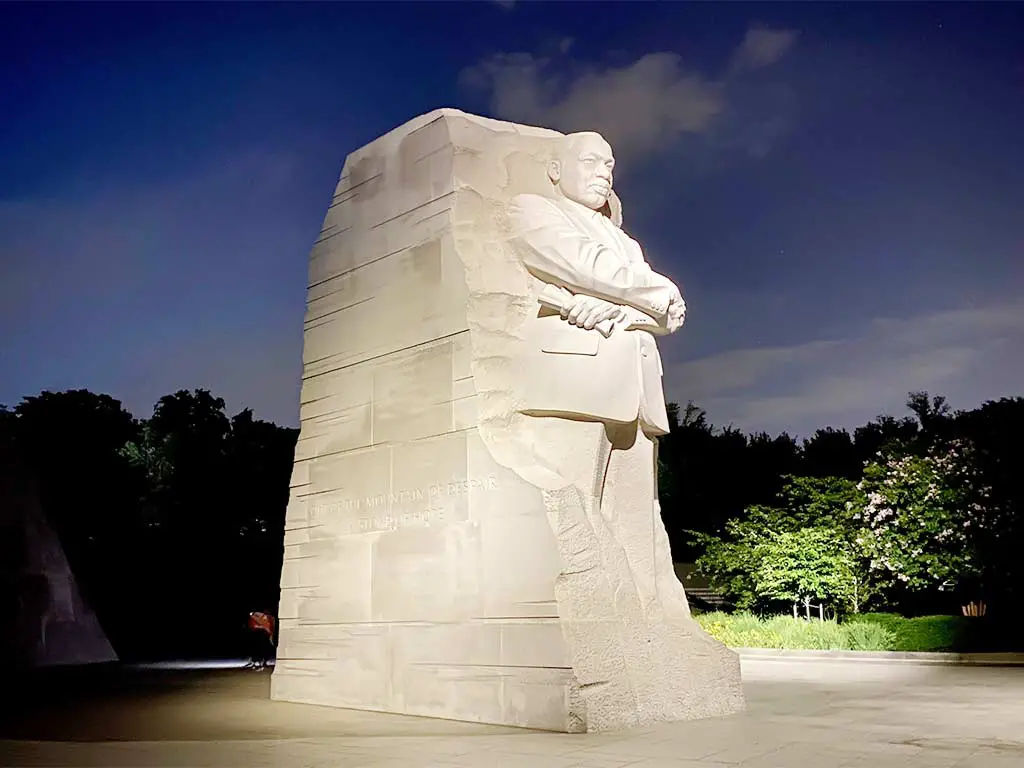
Take time to absorb the powerful symbolism of this memorial, designed to evoke Dr. King’s message of hope, justice, and equality.
Reflect on his enduring legacy and the ongoing pursuit of his dream as you stand in the shadow of his towering statue, surrounded by his poignant words etched in stone.
Consider visiting the memorial during sunrise or sunset for a truly moving experience, as the light casts a different glow on the statue, enhancing the atmosphere and significance of the moment.
3. Take a Tour of Historic African American Neighborhoods
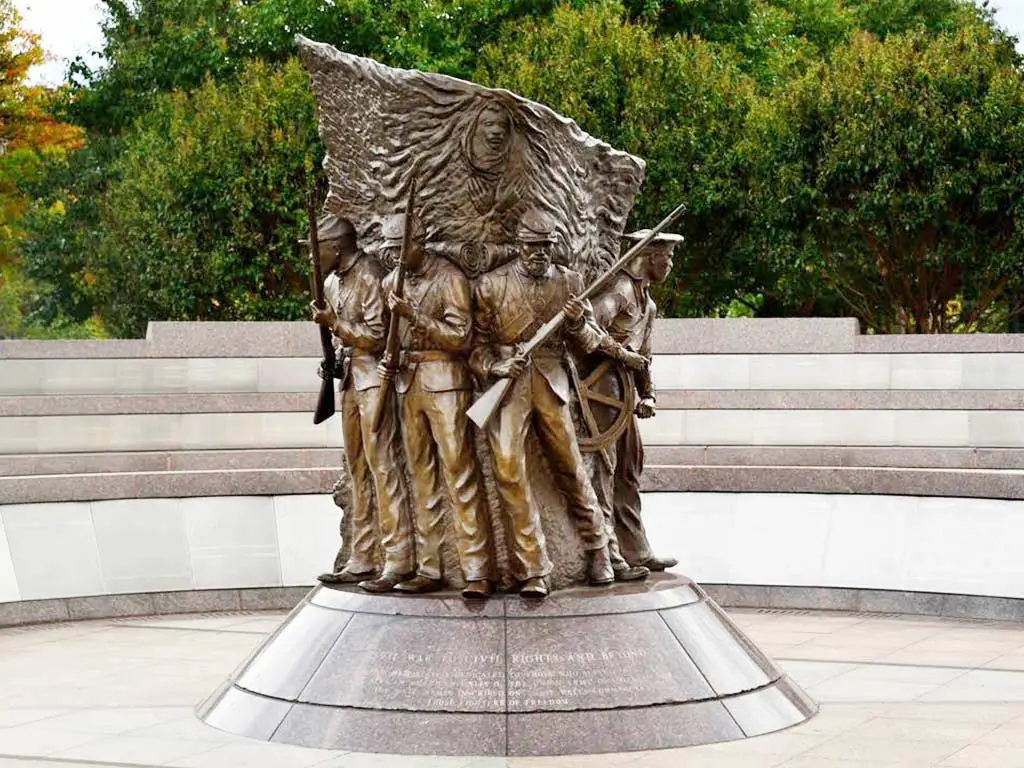
Wander through the streets of U Street, once known as “Black Broadway,” where jazz legends like Duke Ellington once performed.
Explore the vibrant murals and cultural landmarks of Shaw, a neighborhood steeped in African American history and resilience.
Discover the rich history of Anacostia, a neighborhood that was home to Frederick Douglass and is now a hub of artistic expression. Immerse yourself in the stories and legacies that have shaped these communities for generations.
4. Attend a Lecture or Panel Discussion

Engage with scholars, activists, and community leaders as they explore themes of race, identity, and social justice.
From discussions on the intersection of art and activism to lectures on the untold stories of Black history, these events offer valuable insights and opportunities for dialogue.
Consider checking out events at local universities, museums, or cultural centers for thought-provoking discussions and perspectives on Black history and its impact on society. These lectures and panels can provide a deeper understanding of the issues at hand.
5. Explore the Frederick Douglass National Historic Site

Step inside the restored home of Frederick Douglass, where the renowned abolitionist and statesman once lived and worked.
Tour the furnished rooms and grounds, and gain a deeper understanding of Douglass’s life, writings, and tireless advocacy for freedom and equality.
Learn about Douglass’s legacy through guided tours, interactive exhibits, and educational programs at the Frederick Douglass National Historic Site. Immerse yourself in his powerful story and contributions to African American history.
6. Attend a Gospel Brunch

Savor the soulful sounds of gospel music while indulging in a delicious spread of Southern-inspired cuisine.
Experience the joyous atmosphere of fellowship and celebration as talented musicians lift their voices in praise, creating an uplifting experience for all who attend.
Immerse yourself in the rich cultural heritage of the African American community by attending a Gospel Brunch in Washington DC.
Enjoy the harmonious melodies and flavorful Southern dishes while basking in the spirit of togetherness and reverence that fills the air.
7. Participate in a Civil Rights Walking Tour
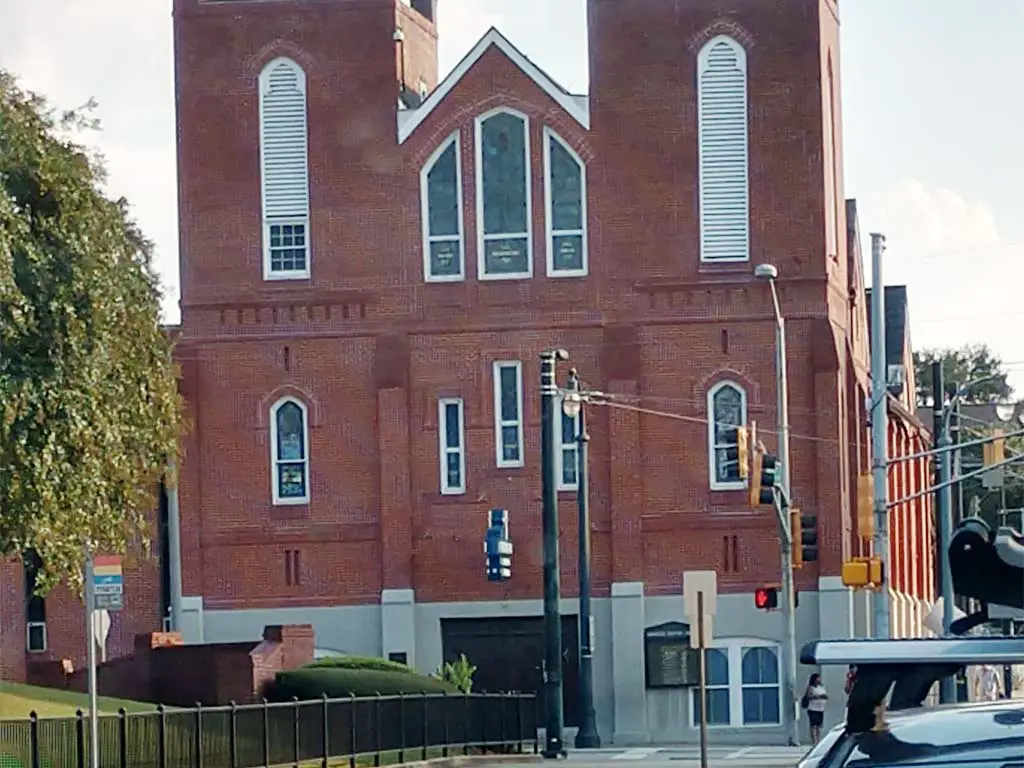
Follow in the footsteps of civil rights leaders as you visit historic sites like the Lincoln Memorial, where Dr. King delivered his iconic “I Have a Dream” speech, and the National Mall, where the March on Washington took place.
Gain a deeper appreciation for the sacrifices and struggles endured in the fight for racial equality. Discover the rich history of the Civil Rights Movement by joining a guided Civil Rights Walking Tour in Washington DC.
Visit iconic landmarks like the Lincoln Memorial and National Mall, immersing yourself in the legacy of those who fought for racial equality.
8. Visit the Lincoln Theatre

Immerse yourself in the rich cultural heritage of the Black community at this historic venue, which has hosted performances ranging from vaudeville shows to jazz concerts.
Marvel at the ornate architecture and relive the moments when legendary artists graced its stage. Experience the soulful ambiance of the Lincoln Theatre, a significant landmark in Black history where iconic performers once captivated audiences.
Let yourself be transported back in time as you admire the intricate details of its architecture and envision the vibrant performances that took place on its stage.
9. Explore the African American Civil War Memorial and Museum

Pay tribute to the thousands of African American soldiers and civilians who played a pivotal role in shaping the outcome of the Civil War.
Browse the museum’s exhibits, which highlight their bravery, resilience, and contributions to the cause of freedom.
Learn about the lesser-known stories and heroes of the Civil War at the African American Civil War Memorial and Museum. Discover how their courage and sacrifices impacted history through engaging exhibits.
10. Attend a Cultural Festival or Event
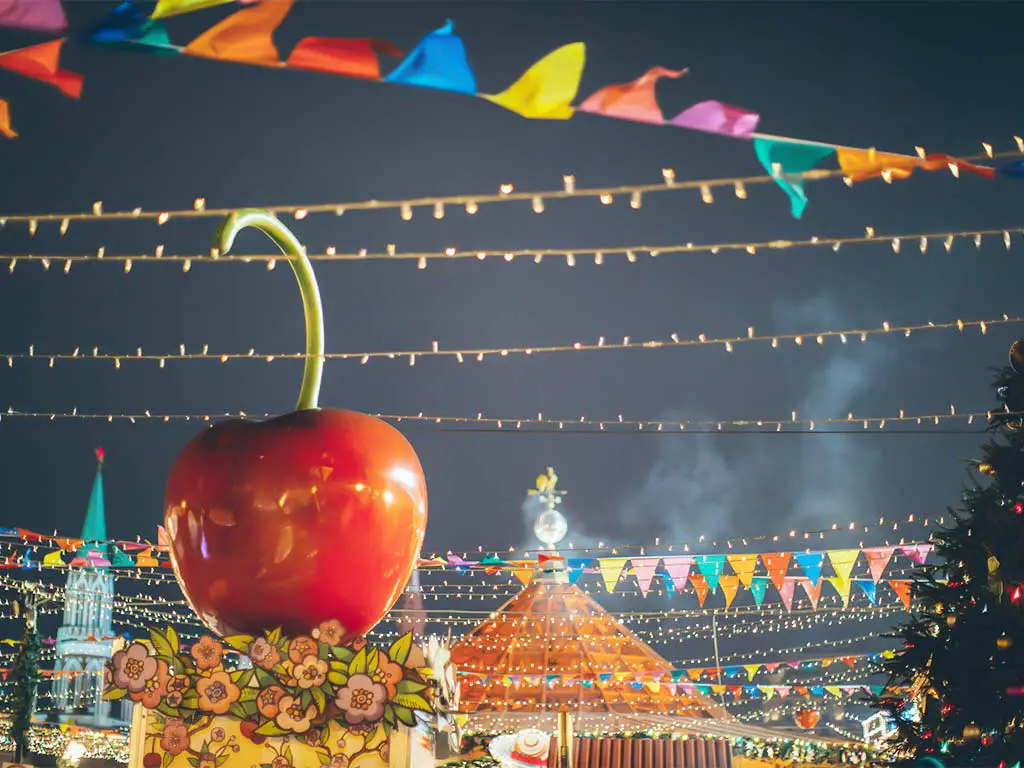
Celebrate the diversity and creativity of the African American community at festivals like the Smithsonian Folklife Festival, where music, dance, and cuisine come together to showcase the richness of Black culture.
Join in the festivities of Juneteenth, commemorating the end of slavery in the United States, with music, food, and family-friendly activities.
Experience the vibrant energy of the Black community at events such as the Smithsonian Folklife Festival, highlighting music, dance, and cuisine. Dive into the celebrations of Juneteenth with captivating music, flavorful food, and engaging family activities.
11. Take a Tour of Black-Owned Businesses

Support local entrepreneurs and artisans by patronizing businesses owned and operated by members of the Black community.
Explore the eclectic shops of Anacostia, browse the galleries of the District’s burgeoning arts scene, and sample the flavors of African American cuisine at restaurants throughout the city.
Discover unique handcrafted goods, artwork, and culinary delights while immersing yourself in the rich cultural tapestry woven by Black entrepreneurs across Washington DC.
Explore Anacostia’s vibrant shops, embrace the thriving arts community, and savor authentic African American flavors citywide.
12. Visit the National Portrait Gallery

Marvel at the diverse array of portraits honoring African American trailblazers, from political leaders like President Barack Obama to cultural icons like Aretha Franklin and Maya Angelou.
Discover the stories behind the faces as you explore the gallery’s collections, which celebrate the achievements and contributions of African Americans throughout history.
Consider joining one of the guided tours offered at the National Portrait Gallery for a more in-depth look at the significance of each portrait and artist.
These tours provide valuable insights into the lives and legacies of these influential figures, enhancing your overall experience at the gallery.
13. Attend a Performance at the Howard Theatre

Experience the magic of live music and entertainment at the historic Howard Theatre, a legendary venue that has hosted some of the greatest names in Black entertainment.
From jazz and blues to R&B and hip-hop, the Howard Theatre continues to showcase the talents of emerging and established artists alike.
For a memorable evening celebrating Black history in Washington DC, attending a performance at the iconic Howard Theatre is a must.
Here, you can immerse yourself in the rich cultural legacy of this venue that has welcomed legendary artists across various music genres.
14. Volunteer with Community Organizations

Make a difference in the lives of others by volunteering with local nonprofits dedicated to serving the needs of the Black community.
Whether you’re tutoring students, organizing community events, or advocating for social change, your time and effort can help create a more equitable and inclusive society.
Consider reaching out to organizations like the Black Youth Project 100, Black Lives Matter DC, or the National Association for the Advancement of Colored People (NAACP) to explore volunteer opportunities that align with your interests and skills.
Your contributions can have a meaningful impact on important causes in the Washington D.C. area.
15. Reflect at the African American Civil War Memorial
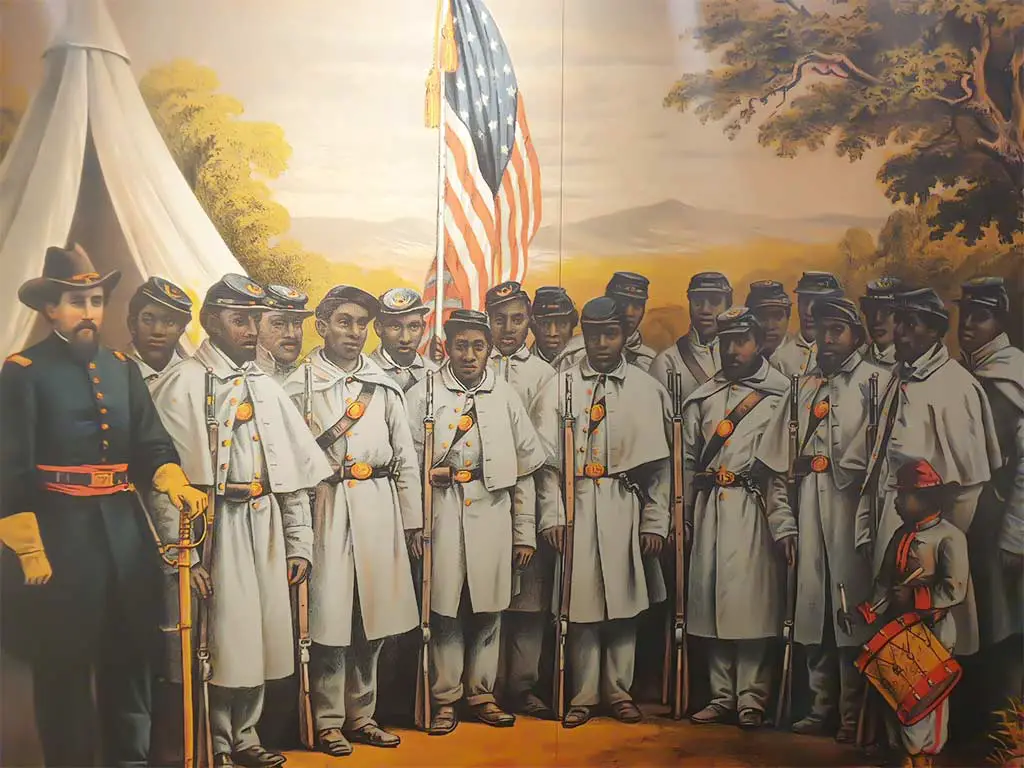
Pause to honor the sacrifices and struggles of the African American soldiers and sailors whose courage helped to secure freedom for future generations.
Trace your fingers over the names inscribed on the memorial’s Wall of Honor, and remember their legacy of resilience, determination, and perseverance in the face of adversity.
Consider attending one of the memorial’s events or participating in a guided tour to gain deeper insights into the historical significance and impact of this important site in Washington DC’s rich Black history.
Frequently Asked Questions
How can one celebrate African American history in Washington DC?
Explore iconic landmarks like the Martin Luther King Jr. Memorial and National Museum of African American History and Culture.
Which historic sites in Washington DC honor African American heritage?
Visit historic sites like the Metropolitan AME Church, Mary McLeod Bethune Council House, and the African American Civil War Memorial & Museum.
How can one immerse themselves in African American history in Washington DC?
Take tours at the Frederick Douglass National Historic Site and participate in role-playing events depicting key historical figures like Martin Luther King Jr., Harriet Tubman, and Rosa Parks.
Why is February chosen as Black History Month?
Historian Carter G. Woodson selected February to encompass the birthdays of Abraham Lincoln and Frederick Douglass, two prominent figures in Black history.
The month celebrates the contributions and struggles of African Americans and promotes awareness of their journey towards liberty and equality.




Allison Brice